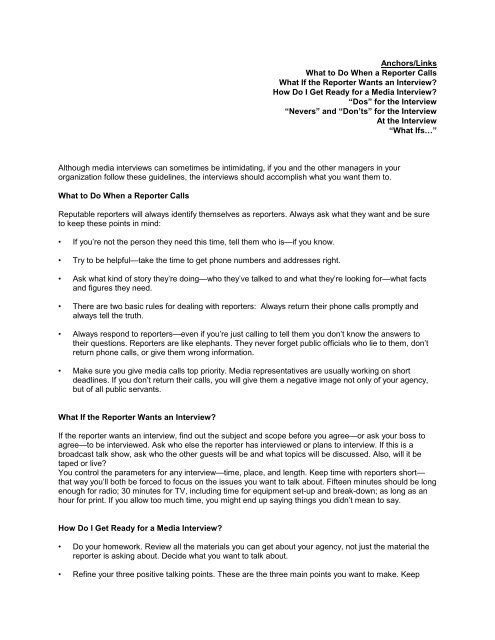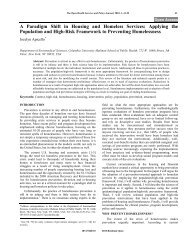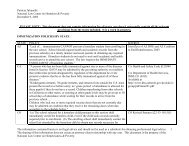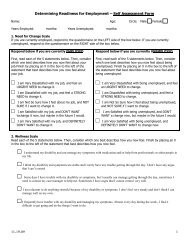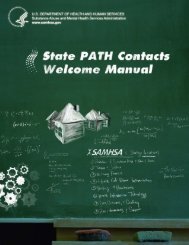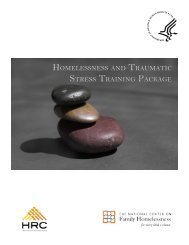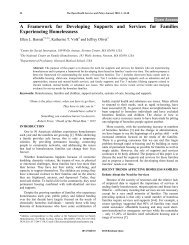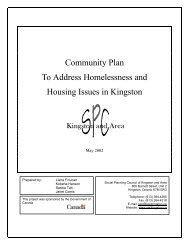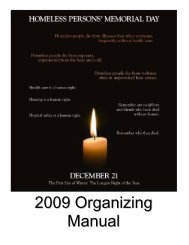How Do I Get Ready for a Media Interview
How Do I Get Ready for a Media Interview
How Do I Get Ready for a Media Interview
You also want an ePaper? Increase the reach of your titles
YUMPU automatically turns print PDFs into web optimized ePapers that Google loves.
Anchors/LinksWhat to <strong>Do</strong> When a Reporter CallsWhat If the Reporter Wants an <strong>Interview</strong>?<strong>How</strong> <strong>Do</strong> I <strong>Get</strong> <strong>Ready</strong> <strong>for</strong> a <strong>Media</strong> <strong>Interview</strong>?“<strong>Do</strong>s” <strong>for</strong> the <strong>Interview</strong>“Nevers” and “<strong>Do</strong>n’ts” <strong>for</strong> the <strong>Interview</strong>At the <strong>Interview</strong>“What Ifs…”Although media interviews can sometimes be intimidating, if you and the other managers in yourorganization follow these guidelines, the interviews should accomplish what you want them to.What to <strong>Do</strong> When a Reporter CallsReputable reporters will always identify themselves as reporters. Always ask what they want and be sureto keep these points in mind:• If you’re not the person they need this time, tell them who is—if you know.• Try to be helpful—take the time to get phone numbers and addresses right.• Ask what kind of story they’re doing—who they’ve talked to and what they’re looking <strong>for</strong>—what factsand figures they need.• There are two basic rules <strong>for</strong> dealing with reporters: Always return their phone calls promptly andalways tell the truth.• Always respond to reporters—even if you’re just calling to tell them you don’t know the answers totheir questions. Reporters are like elephants. They never <strong>for</strong>get public officials who lie to them, don’treturn phone calls, or give them wrong in<strong>for</strong>mation.• Make sure you give media calls top priority. <strong>Media</strong> representatives are usually working on shortdeadlines. If you don’t return their calls, you will give them a negative image not only of your agency,but of all public servants.What If the Reporter Wants an <strong>Interview</strong>?If the reporter wants an interview, find out the subject and scope be<strong>for</strong>e you agree—or ask your boss toagree—to be interviewed. Ask who else the reporter has interviewed or plans to interview. If this is abroadcast talk show, ask who the other guests will be and what topics will be discussed. Also, will it betaped or live?You control the parameters <strong>for</strong> any interview—time, place, and length. Keep time with reporters short—that way you’ll both be <strong>for</strong>ced to focus on the issues you want to talk about. Fifteen minutes should be longenough <strong>for</strong> radio; 30 minutes <strong>for</strong> TV, including time <strong>for</strong> equipment set-up and break-down; as long as anhour <strong>for</strong> print. If you allow too much time, you might end up saying things you didn’t mean to say.<strong>How</strong> <strong>Do</strong> I <strong>Get</strong> <strong>Ready</strong> <strong>for</strong> a <strong>Media</strong> <strong>Interview</strong>?• <strong>Do</strong> your homework. Review all the materials you can get about your agency, not just the material thereporter is asking about. Decide what you want to talk about.• Refine your three positive talking points. These are the three main points you want to make. Keep
them positive. Keep telling yourself his is an opportunity. With a little thought, you can anticipate thereporter’s questions and tailor your answers according to the three ain points you want to get across.From your point of view, the interview should be driven by these messages, not by the questions. Planto use your three points as the foundation <strong>for</strong> all the questions you will be answering.• Practice talking in 20-second sound bites. Practice making your points clearly and briefly. <strong>Do</strong>n’t usedoublespeak, government-speak or jargon-phrases no one else understands. Talk in plain language.Use appropriate words. Speak in the active voice, rather than the passive.• Organize your ideas logically—from general to specific; or from specific to general; from positive tonegative; step-by-step; or from most important to least important.• Figure out how to personalize and humanize your in<strong>for</strong>mation; tell how it affects the viewer or reader.• <strong>Get</strong> some show-and-tell materials ready—a book, a simple graphic to illustrate a complex statistic, orperhaps a model of what you’re going to talk about. If you have videotape, get an extra copy ready togive to the correspondent.• Find out everything you can about the reporter or correspondent. What is his or her reputation <strong>for</strong>fairness? What stories has the reporter done? What types of stories has the publication or stationdone in the past? Are the stories long and in-depth, or short, lacking details? What is the slant to mostof the stories?• Scan the news of the day to make sure you’re prepared <strong>for</strong> any last-minute questions. For a TVinterview, watch the news show to see how much air time each story gets. If this is a print interview,scan the latest issue of the publication.“<strong>Do</strong>s” <strong>for</strong> the <strong>Interview</strong><strong>Do</strong> your homework be<strong>for</strong>e you talk to a reporter. Be prepared <strong>for</strong> the reporter’s worst questions withthree positive points you want to get across. Practice what you want to say. Remember you’re sellingyour activity. Talking to a reporter is an opportunity.Speak in short sentences using plain language. For TV and radio, think in terms of 20- or 30-secondanswers. This assures the reporter will use what you say.Smile. Act like you enjoy what you’re doing. Call reporters by their first name. Look interested andalert.Tell a positive story. You do a lot of good things; tell the reporter about your three positive points.If you don’t know the answer, say, “I don’t know.” If you do know the answer and can’t tell it now, tellthe reporter when you can give him or her the answer. Refer the reporter to someone who does knowthe answer, or offer to find out who does.If a TV station offers you makeup, take it. The TV camera will add 10 years and 10 pounds.Remember, the TV pros all wear makeup.Dress conservatively and simply. Be remembered <strong>for</strong> what you said, not what you wore. Ignore thisrule if you’re a rock star.Stop talking when you’ve made your point. <strong>Do</strong>n’t ramble on and on. <strong>Do</strong>n’t speculate. Stick to your keymessage. Let the reporter worry about the empty air space.If a reporter asks several questions in a row, pick the one you want to answer. Or, ask the reporter to
epeat the question.Have show-and-tell material. A simple pie chart works well. Have a videotape? Take it, too.Take advantage of the opportunity at the end of the interview when the reporter asks if there isanything you’d like to add. Repeat your three talking points and summarize.“Nevers” and “<strong>Do</strong>n’ts” <strong>for</strong> the <strong>Interview</strong>Never say, “No comment.” “No comment” means “guilty” to most people when they hear it.Never say anything “off the record.” Assume all microphones are live.The most important rule: Never say anything to a reporter you don’t want to see on TV or read on thefront page of a newspaper.Never lie to a reporter.Never lose your temper. Be polite, but firm.Never use profanity or slang. <strong>Do</strong>n’t say anything that could even remotely be construed to be off-color,sexist or racist. <strong>Do</strong>n’t comment on anyone’s age, religion, or politics. Tell jokes ONLY if they are selfdeprecating.Never say “uh.” Drop all the uhs from your speech. Make your pauses silent.Never wave your hands. <strong>Do</strong>n’t bob and weave your head around. Sit still.Never answer hypothetical questions. <strong>Do</strong>n’t speculate. Be specific. Stick to what you know.Never comment on what others have said, particularly if you haven’t seen or heard it. <strong>Do</strong>n’t verifysomething that might not be true.Never use doublespeak, government-speak, or jargon. Use numbers in an interesting way. Make yourin<strong>for</strong>mation easy to understand. Personalize your in<strong>for</strong>mation. Relate it to the reporter. Humanize it.Never talk to a reporter without doing your homework. Prepare. Turn the interview into a sales call.Never stop talking after you’ve answered a “yes” or “no” question. Keep going. Say something like,“Yes, but you should also know...” Or “No, but let me elaborate...” But keep your response very briefand to the point.At the <strong>Interview</strong>Smile and enjoy yourself. Relax the reporter and you’ll be relaxed, too. Tell the reporter you’re looking<strong>for</strong>ward to the interview. The best way to diffuse a hostile situation is to be warm and accommodating.When the interview begins, remember that you are the expert. <strong>Do</strong>n’t smile and nod your head as theinterviewer asks a question—just look interested.Make sure your body language and speech patterns back up your sincerity. To combat nervousness thatan audience might interpret as insincerity or untruthfulness, sit up straight and take deep breaths. <strong>Do</strong>n’t sitback on soft seats. Sit on the <strong>for</strong>ward portion of the seat cushion and keep your back as straight aspossible. If your mouth is dry, bite the sides of your tongue—it will make you salivate. Stop talking when
you’ve made your point. Many people say things they didn’t mean to say after they’ve made their majorpoint. <strong>Do</strong>n’t worry if there is silence. It isn’t your job to fill it up.<strong>Do</strong>n’t let the reporter put words in your mouth. If the reporter uses inaccurate facts when asking aquestion, correct the error. <strong>Do</strong>n’t fall into the black hole of “no comment.” Instead say: “That’s not thecritical issue, this is...” Or, “That’s currently part of a law suit. Our policy is not to discuss ongoinglitigation...” Or, “We’ll have an announcement about that later this week.”If this is a TV interview, remember that TV is not always fair. TV’s visual impact can make stories moreemotional than any other media. You are not seeking the truth—don’t let yourself get pulled into such asearch. You are not there to answer questions; you’re there to elaborate on your three talking points.Never lose your temper. TV’s visual impact will magnify your emotional response.Let the reporter know you are keeping track of the interview. Ask if you can tape the interview and have atape recorder ready. Turn it on when the interview starts. Tell the reporter that you want to evaluate howclearly you are answering the questions so that you can be a better source.Never <strong>for</strong>get that the interview isn’t over until the reporter leaves. TV correspondents commonly shoot B-roll, sometimes called cutaway footage, or cutaways. These are used to fill in the interview so it isn’t just atalking head. B-roll also makes the final produced story more visually interesting. Camera crews usuallyleave the sound on while taping the B-roll. The reporter might ask you again how you really feel about anissue. Make sure you repeat only what was said earlier, as the mike is still live and anything you say isbeing recorded.Sometimes, radio or print reporters will also leave their tape recorders running to capture any off- the-cuffremarks that you might make.If you are giving a telephone interview, assume the reporter is taping the conversation. That way you won’thave any regrets later.At the end of the interview, thank the reporter <strong>for</strong> the opportunity.The media world isn’t equal: There are inequalities when you agree to a media interview. Reporters cancancel at the last minute. You can’t. If you can’t make the interview you’ve agreed to, you must provide asubstitute. Reporters can be late, but you can’t.“What Ifs…”• What if the reporter interrupts or tries to rush you? Ask to finish your statement and begin what youwere saying again. <strong>Do</strong>n’t start in the middle; make a complete, but succinct, statement.• What if a reporter catches you when you’re not prepared and tries to interview you? Smile and walkaway—even if the video camera is rolling and the reporter is sticking a mike in your face. Tell thereporter you’re glad to see him or her, but you don’t have time to talk now. Give your phone numberand suggest they call your office to set up an appointment. Never talk to a reporter unless you’vetaken the time to prepare.• What if the reporter asks how you “really feel” about an issue? Give the same answer you gavebe<strong>for</strong>e. There is no room <strong>for</strong> your personal opinion, only your professional one. If you don’t say it, thereporter can’t use it.• What if there is a silent, awkward pause after you’ve answered a question? Smile and wait out thepause. The reporter is using one of the most effective techniques in interviewing—getting you tovolunteer in<strong>for</strong>mation. Stop talking when you’ve made your point.
• What if you don’t understand the question? Ask the reporter <strong>for</strong> clarification. Some reporters don’t askclear questions.• What if you can’t think of the answer to the question? Smile. Be serene. Ask the reporter to repeat orclarify the question while you take a mental break. Buy time by saying, “That’s a good question.” If youreally can’t come up with an answer, tell the reporter you need to look it up or consult with someoneelse and offer to call the reporter later in the day with the answer.• What if you start to answer a question and make a mistake? Start over. If this is a TV or radiointerview, tell the reporter you are going to start over.This answer is from The Communicators Guide, published in December 2000 by the FederalCommunicators Network (www.fcn.gov), under the sponsorship of then-Vice President Gore’s NationalPartnership <strong>for</strong> Reinventing Government. The guide is available on the FNC web site in HTML <strong>for</strong>mat.


